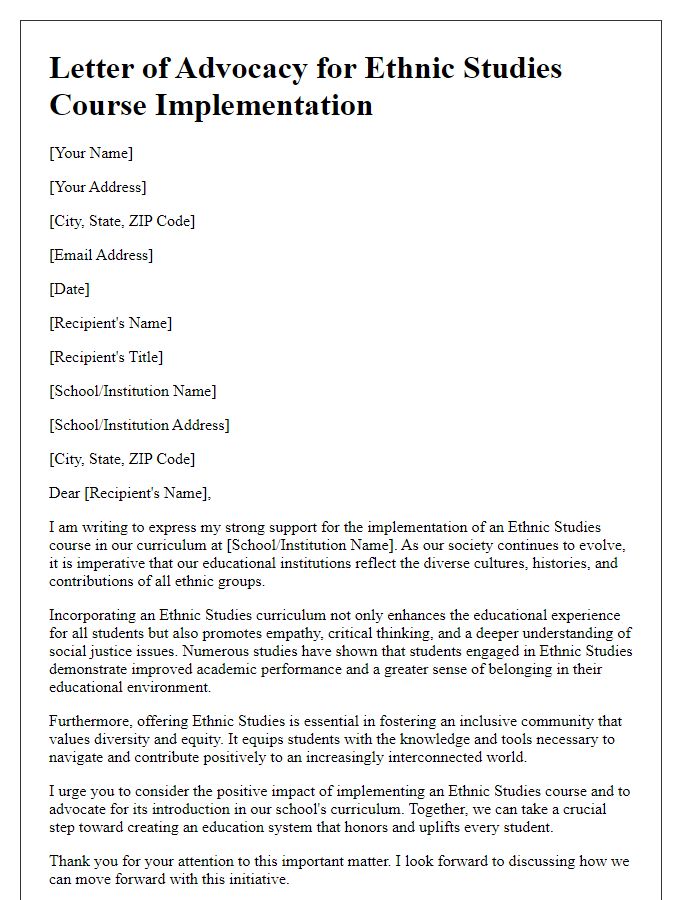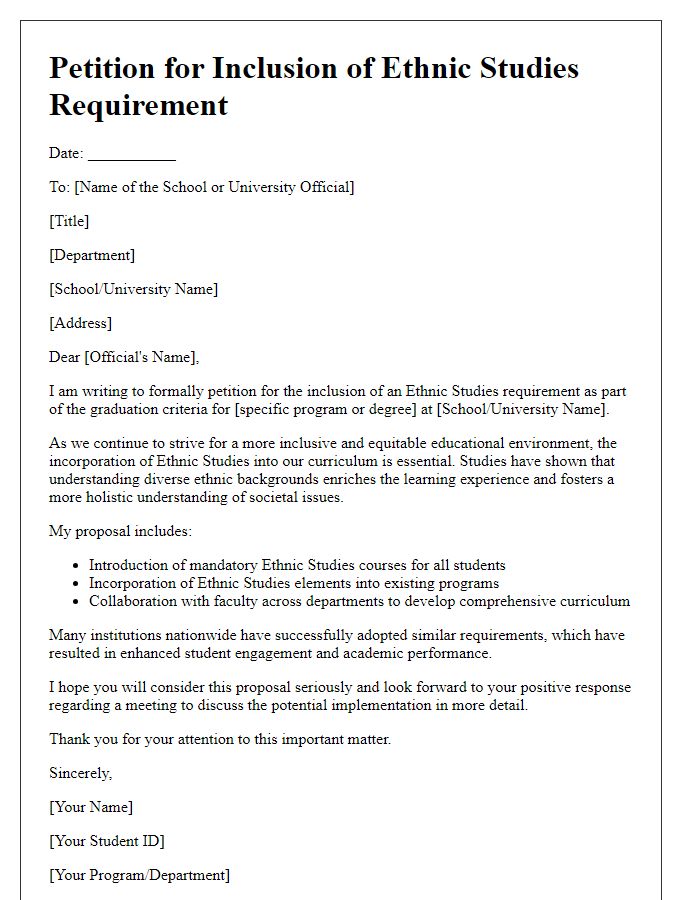Are you passionate about learning more about the rich tapestry of cultures that shape our society? If so, you're not alone! Many students are excited about the opportunity to explore ethnic studies, which offers invaluable insights into the diverse histories and perspectives that influence our world today. Dive into this article to discover how you can advocate for the addition of an ethnic studies course at your school!

Purpose and Justification
The request for an ethnic studies course emerges from the growing recognition of the importance of understanding diverse cultural perspectives within educational systems. Ethnic studies, grounded in social justice and historical context, can foster critical thinking skills through the examination of race, ethnicity, and identity issues. Research indicates that students exposed to such curricula demonstrate heightened cultural awareness and empathy, improving campus climate. Institutions like California State University have reported positive outcomes such as enhanced student engagement and retention rates among participants in ethnic studies programs. Expanding educational offerings to include ethnic studies can cultivate a more inclusive environment, preparing students to navigate the complexities of a multicultural society.
Importance of Diversity and Inclusion
Diversity and inclusion play crucial roles in fostering understanding and acceptance within society, particularly within educational environments. Ethnic studies courses enrich academic curriculums by exploring the historical, cultural, and social fabric of various ethnic groups in the United States, such as African Americans, Native Americans, and Latinos. These courses (typically designed for high school or college students) not only address systemic inequalities but also promote critical thinking about identity, power dynamics, and social justice issues. Research indicates that students exposed to diverse perspectives are more empathetic and engaged citizens, nurturing an inclusive climate (vital for community cohesion). Implementing ethnic studies can also positively influence academic performance and retention rates among marginalized student groups, ultimately closing achievement gaps and enhancing overall school culture.
Student Interest and Demand
A growing number of university students are expressing interest in ethnic studies courses across campuses in the United States and Canada. Surveys conducted in 2023 indicate that over 65% of students believe these courses enhance cultural competence and understanding. Institutions like the University of California, Los Angeles (UCLA) have seen an increase in enrollment in ethnic studies programs, rising by 40% since 2020. The demand emphasizes the critical role of diverse perspectives in education. Ethnic studies courses, which focus on racial and cultural histories, provide essential insights into societal dynamics, promoting inclusivity and equity in academic environments. As a response, universities are encouraged to develop more comprehensive curricula in ethnic studies to meet this growing academic interest.
Curriculum Integration and Academic Enrichment
The integration of ethnic studies courses into school curricula can significantly enhance academic enrichment and foster a more inclusive educational environment. Ethnic studies, which focus on the history and culture of diverse racial and ethnic groups, can provide students with critical perspectives. For instance, researching events such as the Civil Rights Movement (1950s-1960s) and the impact of legislation like the Civil Rights Act of 1964 can deepen understanding of systemic inequality in the United States. Locations such as San Francisco and Selma serve as historical landmarks of social justice, resonating with various themes of identity and activism. Implementing an ethnic studies program can enhance student engagement, promote critical thinking skills, and celebrate multiculturalism, preparing students for a diverse society.
Community and Cultural Relevance
The need for an ethnic studies course in academic institutions is becoming increasingly vital for promoting community and cultural relevance in education. Ethnic studies programs provide in-depth analysis of diverse histories, cultures, and experiences, such as African American, Latinx, Indigenous, and Asian American narratives, helping students gain a comprehensive understanding of societal structures. Research indicates that exposure to these subjects significantly enhances critical thinking and empathy among students, fostering a more inclusive environment. Furthermore, incorporating ethnic studies aligns with educational standards aimed at cultural competence, preparing students for an interconnected world. This initiative can transform classrooms into spaces that honor diversity, ultimately enriching the educational experience and promoting social justice.
Letter Template For Requesting Ethnic Studies Course Samples
Letter template of appeal for inclusion of ethnic studies in the curriculum.

Letter template of inquiry regarding the availability of ethnic studies classes.















Comments